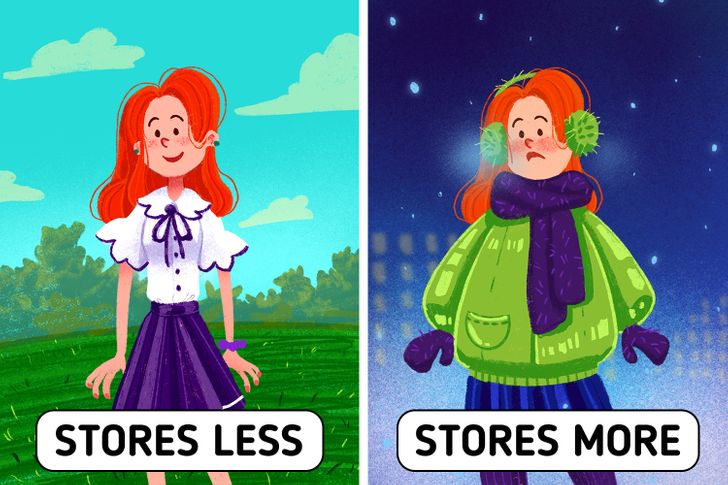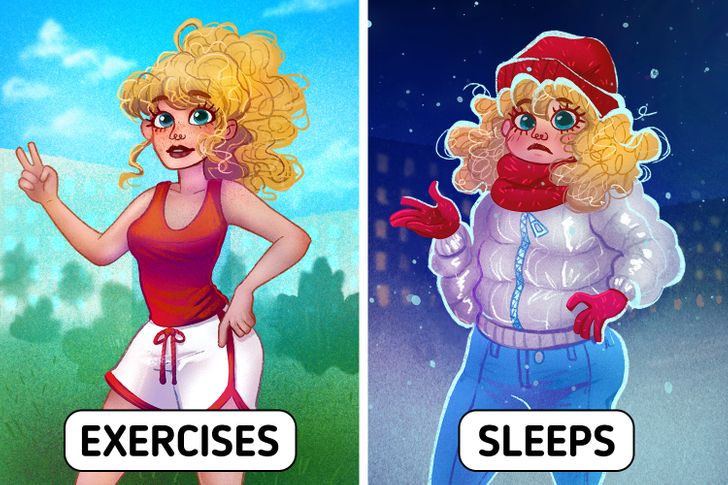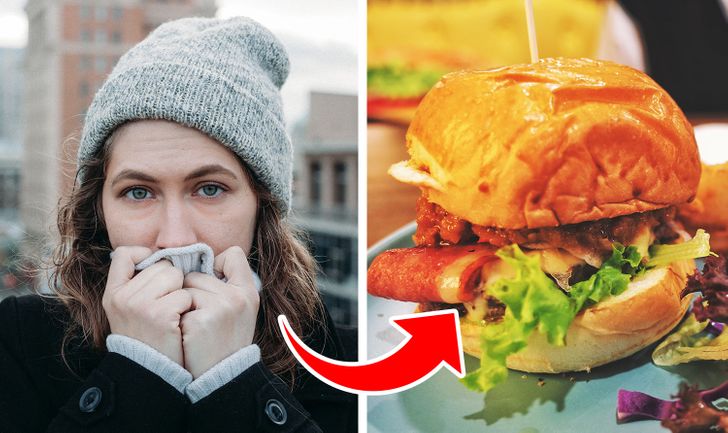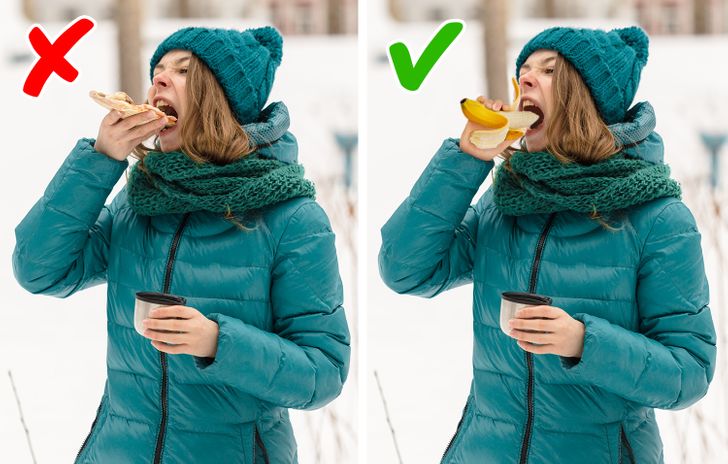Cool
Science Explains Why You Gain Weight in Winter and Here Is What You Can Do to Prevent It

People often blame the holiday season for winter weight gain and they have a valid reason — partying and revelry is a perfectly viable culprit. But according to several studies, there is more to this issue than overeating at a Christmas party. With the lack of sunlight and our survival mechanisms at play, weight gain seems not only real but difficult to avoid.
We at Bright Side did our homework and now we’re fully prepared for the upcoming winter — and we encourage you to join us on this journey.
1. Our metabolism gets boosted.
In winter, our metabolism noticeably improves: our body tries to burn more energy to stabilize its temperature and stay warm. And this means we need more food for these extra energy taxes. Naturally, we feel the need to eat more to catch up to our new metabolic rate.
- Solution: Keep yourself and your environment warm and comfy to minimize the resources your body spends on heating itself so you won’t need extra food. Fortunately, it’s not that hard in this day and age with our temperature-controlled surroundings.
2. Our cells store more fat.

One study revealed that our fat cells react positively to sunlight. Cells that are closest to the skin, when exposed to the sun, get smaller and thus store less fat. So, on the flip side, the lack of sunlight may boost the cells’ ability to store fat, which makes us more receptive to weight gain.
- Solution: Get as much sun exposure as you can. Wake up earlier so you have a higher chance of catching the sunrise and spend more time outdoors. Squeeze as much sunlight as you can out of the day!
3. We’re getting ready for “hibernation.”
Humans are more similar to bears than we realize: we both try to sleep during the cooler months. Science suggests that with cold our primitive instincts kick in and we unconsciously try to stock up on calories, just like bears preparing for hibernation. Somewhere deep within us still lives the fear of not being able to find the necessary nutrients when foods become scarce in winter.
- Solution: Relax. There’s nothing you can really do about it. So cozy up in blankets with your favorite Netflix series and hot chocolate, and imagine that you’re a bear — the only difference is that you stay awake half of the time.
4. We try to get warm via eating.
The chill might trigger some behavior changes that encourage fat storage. Specifically, eating is a way to raise our body temperature and so when the cold hits, we’re likely to reach out for food. When our body is metabolizing something, it generates heat naturally, so we crave more food to help warm us up. We also tend to eat more “comfort” foods like hot pastries and sweets.
- Solution: Eat the food that takes longer to digest — like things that are rich in healthy fats, proteins, and carbs — since they will keep you warm for longer. A special mention goes to bananas, which are packed with vitamin B and magnesium, helping your thyroid and adrenal glands regulate your body temperature.
5. We get more sleepy.
The lack of sunlight we experience when days get shorter in winter affects our hormones. Our pineal glands respond to the sunlight deficiency by producing more melatonin, responsible for our sleep-wake cycle. So we tend to feel more sleepy, while higher melatonin levels can increase our appetite. Basically, we find ourselves eating more and moving less during the cold months.
- Solution: Try to control your melatonin production by eating foods that contain it and exposing yourself to sunlight. Tomatoes, olives, cereal, and unprocessed milk have considerable amounts of melatonin. Coffee beans have a significant concentration as well. And all this stuff is also rich in vitamins and minerals, so not only do they balance melatonin levels, but they also boost your health overall.
6. We’re less likely to exercise.

With everything stated above, it goes without saying that we are much less motivated to hit the gym in the winter. Сold weather and shorter days discourage us from going outside for our usual activities. So, the winter lifestyle, no pressure to work on that beach bod, and spending more time indoors can really add to the weight gain.
- Solution: Switch to exercises you can do at home. Try to avoid a sedentary lifestyle (it’s gonna be roughly 3 months, you don’t want to sit the whole time!). Add a 20-30 minute walk to your daily schedule and find a walking buddy to keep yourself accountable. Winter sports like skiing and ice skating are not only helpful but, also extremely fun.
Have you noticed yourself eating more during the cold months? Share your favorite winter meal with us!
Comments
this is all so true. When winter comes all I want to do is to eat something warm
Somehow I manage to lose weight during winter and then I eat it all back during the warm periods 🤣
Related Reads
10 Jaw-Dropping Moments When People Stumbled Upon Secrets They Weren’t Meant to See

12 Small Acts of Kindness That Quietly Changed Lives

17 Moments That Prove Even Small Kindness Can Be Powerful

10 Dating Stories That Started Like Rom-Coms but Ended Like Horror Movies

My Family Excluded My Girlfriend From Christmas Because We’re Not Married

12 Stepparents Who Kept Showing Up Even When They Weren’t Wanted

15 Stories That Show Kindness Is a Quiet Language the World Needs

12 Stories That Capture the Sweet and Sour Memories of Blended Families

I Refused to Be Treated Like a Maid in My Own Home—So I Changed the Rules

10 Hospital Workers Who Prove Kind Heart Is a Powerful Medicine

I Became a Free Nanny After My Sister’s Divorce, Then She Crossed a Line

I Refuse to Be Treated as Less Reliable Because I’m a Single Mom




